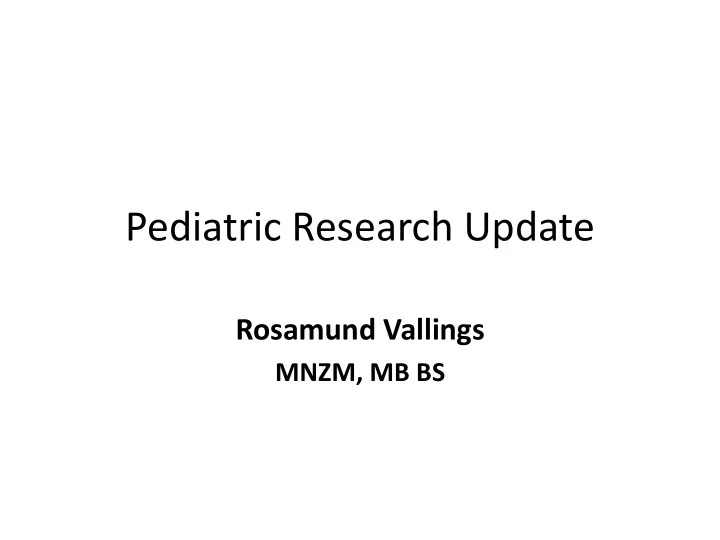

Pediatric Research Update Rosamund Vallings MNZM, MB BS
ME/CFS Diagnosis a nd Management in Y oung P eople: A Primer Published in Frontiers in Pediatrics, June 2017 - Vol 5, article 121 Produced by panel of 10 experts with 20 years experience in ME/CFS (199 refs)
Epidemiology • Prevalence: 0.1 -0.5% (studies vary) • Peak age of onset: 11-19 (I.Bakken) • Female:Male = 3-4:1 (S.Nijhof) • Family history – 20% (55% monozygotic twins) • Wide spectrum of severity • Commonest cause of longterm school absence • Unpredictable course, but more favourable than adults
R Vallings’ patients 2015-17 • 126 cases aged 4-18 (=10% total CFS database) • 7 misdiagnosed – did not fit criteria • Of 119 cases – 18 had a family history (15%) • Sex ratio – male:female 1:3 • Onset trigger: • Infectious mono – 36 (30%) • Other infection – 47 (40%) • Accident – 9 (7.5%) • Overexercise – 9 (7.5%) • Severe allergy – 4 (3.4%)
Melbourne Study of 700 (K.Rowe) • 60-88% reported “recovery” (over 1-15yrs) • May have learnt to manage life better, but some symptoms persist. • Most important determinant of functioning was maintaining education. • 95% are studying or working fulltime
Aetiology/Pathophysiology • Infection common trigger (partic EBV) • Overexertion, stress, sleep disorder, trauma etc. • High co-morbidity with orthostatic intolerance and joint hypermobility (60% - 95%) (P.Rowe) • Immune dysfunction – oxidative stress, ↑WBC apoptosis (F.Khan) • Beneficial response to IV immunoglobulin (K.Rowe) • Brain imaging: deficits in emotional conflict functioning (L.Wortinger) • Pittsburg sleep quality index = dysfunction (E.K.Josev)
Diagnosis • No specific test • Case definitions tend to be for adults • 2006 pediatric definition (D.Bell)too complex • Adapted to 2017 – simpler, more specific - Included PEM (Ped Primer) • Ongoing work into case definitions (L.Jason) • Long delay in diagnosis (I.Bakken) • Importance of recognising co-morbidities
Clinical diagnosis • Diagnostic worksheet (Pediatric Primer) • Exam to include neurological and psych aspects • Look for co-morbidities and treat • PEM after physical and mental exercise raises probability of CFS
Co-morbid conditions • Orthostatic intolerance 60-95% (P.Rowe) • Ehlers Danlos Syndrome - 60% (P.Rowe) • Gynae symptoms premenstrually • Non-IgE mediated food allergies – 33% - commonest is milk protein (P.Rowe) • Mast-cell activation syndrome (assoc with EDS and OI) – similar symptoms to CFS
Psychological reactions • = response to chronic illness • Study 400 patients (K.Rowe) – 25% clinically depressed (cf 20% healthy controls) • O.I. and EDS leads to greater anxiety • Suicidal thoughts only if CFS associated with major depression • Adversity ++ due to misdiagnosis as MDD (J Newton) • NB Factitious disorder by proxy (ME Ass UK) • School phobia (W.Fremont)
Management/treatment • Paucity of literature • Primer recommendations from very experienced clinicians • Aim to improve function, relieve symptoms, ongoing support, educate school personnel • Most important issues: Validation of illness, supportive doctors, removal of fears, management plan (K.Rowe)
Support/coping sk ills • Need sense of achievement (K.Rowe) • Management plan important • Include social & emotional needs (E.Crawley) • Include gentle paced exercise – not GET(F.Twisk) • Avoid “boom/bust” (L. Jason) • CBT of limited value (no change in immune abnormalities) • Lightning Process – (E.Crawley) – outlandish claims – does not “cure”
Pharmacological Rx • Extreme sensitivity to medication • Very small doses • Treat: Sleep, Pain, Nausea, O.I. • No trials in children for treating fatigue with drugs
Diet/supplements • Balanced nutrition • Extra salt for O.I. (P.Rowe) • Vit D • Magnesium • B12 (B.Regland) • ?probiotics
Alternative/complementary • Mainly anecdotal • Watch for interactions • Massage and good diet – only approaches deemed helpful (K.Rowe – 700 patients) • Sense of relief when parents stopped the search for cure (K.Rowe) – may have tried up to 30 approaches!
Severely affected children (N.Speight) • Severe – 5-10% • Very severe – 2-5% • Physicians unprepared and inexperienced • Parents best caregivers • NB Vit D, osteoporosis, sensitivity to meds • Effects on family → sibling anxiety • Prognosis – 24pts over 7-10 years duration: 2 recovered, 15 improved, 7 still severely ill
Education • Commonest cause of long term absence • Poor cognitive function • Engagement in education – key issue leading to improved ability to function (K.Rowe) • →Fulfilment of aspirations & peer support • Intellectual reasoning OK – can keep up if paced (F.Newton) • Disbelief is a major stress (F.Newton)
Educational support • Educational accommodations required • Maybe homebound • Effects of travel, noise etc (P Tucker) • Cognitive testing may not be accurate • Educational fact sheet required for teachers • Letter to doctors to support education plan • Robot in classroom (Norway,UK) (J B Ø rsting)
The Fu ture • S Knight leading pediatric research programme in Australia looking at brain imaging associated with cognition. • L Jason further studies into epidemiology • David Bell overview and conclusion (Written for Open Medicine Foundation)
Recommend
More recommend